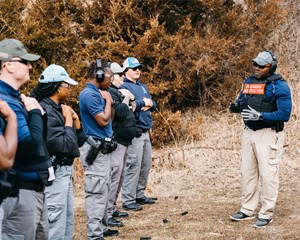"It takes a special person at this point to say, 'Yeah, I want to do that,'" says police chief J. Darren Stewart in Stonington, Conn.
“這種情況下只有特殊之人才會說,‘是的,我想做。’”康涅狄格州斯托寧頓警察局長J·達倫·斯圖爾特說。
As a child, Ti'Aja Fairlee knew she wanted to become a police officer. She was drawn to reading crime and mystery books and was fixated on police cars, even though she had mostly negative interactions with law enforcement growing up in East St.Louis, Ill. Her father had multiple run-ins with police, who beat him, Fairlee says, and the officers who lived near her were "rude."
提阿加·費爾利在孩童時就知道自己想當一名警察。盡管她在伊利諾伊州東圣路易斯長大,與執法部門的互動大多是負面的,但她對犯罪和懸疑類書籍很感興趣,對警車也很著迷。費爾利說,她的父親曾多次與警察發生沖突,警察毆打了他,住在她家附近的警察也很“粗魯”。
When Fairlee joined Lincoln University's police academy, some of her family members called her a "traitor," as did strangers on the street who saw her in her academy uniform. For a moment, the 20-year-old says, "I felt like I'm betraying my dad." But Fairlee thinks about the constant injustices that communities of color face daily and how she has never met a police officer who is both Black and a woman. As the Black Lives Matter movement exploded last year, she knew the profession needed more people who looked like her. "It kind of pushed me to do better," she says.
當費爾莉加入林肯大學警察學院時,她的一些家人稱她為“叛徒”,街上看到她穿著警校制服的陌生人也這么說。這位20歲的年輕人說:“我覺得我在背叛我的父親。”但費爾莉想到了有色人種社區每天持續面臨的不公正,她從來沒有見過黑人女警察。隨著去年“黑人的命也是命”運動的爆發,她知道這個職業需要更多像她這樣的人。“這在某種程度上能讓我做得更好,”她說。

It's a sentiment shared overwhelmingly among students in Lincoln's academy. In 2014, when Davion Waters was a high school freshman, police detained him, mistaking him for a robbery suspect in his first bad encounter with police. Waters says he was walking home from the library in St. Louis when two police officers pulled up in a patrol car, immediately handcuffed him and made him sit on the curb until they confirmed they indeed had the wrong person. Waters, 13 at the time, says he was "shaken up" by the incident. Later that year, he started an internship with the same police department that had detained him.
林肯學院的學生都有同感。2014年,當戴維·沃特斯還是一名高一學生時,警察因誤認為他是搶劫嫌疑人將他拘留。這是沃特斯第一次與警察發生沖突。沃特斯說,當時他正從圣路易斯的圖書館步行回家,這時兩名警察攔下了一輛巡邏車,立即給他戴上手銬,讓他坐在路邊,直到他們確認自己抓錯了人。沃特斯說,當時13歲的自己被這件事“驚到了”。之后那年晚些時候,他便開始在拘留他的那個警察局實習。
"It's about changing the whole culture," says Waters, now 22. "In my eyes, I don't think all officers are the same. I want to change that stigma."
“這事關改變整個文化,”沃特斯說,如今他已經22歲。“在我看來,我不認為所有的警察都一樣,我想摘掉這種污名。”
In 2018, when Hill pitched the idea for a police academy to Lincoln University's new president, Jerald Jones Woolfolk, she greenlighted it on the spot. Hill then went to work securing the necessary state approvals and support from local leaders. When it was time to recruit students in the middle of 2020, Hill worried that societal upheaval might deter them from enrolling. The opposite happened. With just word-of-mouth advertising and some flyers, 27 students applied. Fourteen were not admitted because of financial and background-check issues, and two dropped out in January for personal reasons, Hill says.
2018年,當希爾向林肯大學新校長杰拉德·瓊斯·伍爾福克提出建立警察學院的想法時,她當場便同意了。之后希爾開始努力爭取必要的國家批準和當地領導人的支持。在2020年中期招生的時候,希爾擔心社會動蕩可能會阻止他們入學。不過情況相反。27名學生僅憑口頭宣傳和一些傳單便提交了申請。希爾說,有14名學生因為財務和背景調查問題沒有被錄取,2人在1月份因個人原因退學。
譯文由可可原創,僅供學習交流使用,未經許可請勿轉載。












